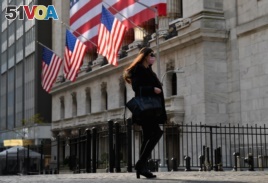20 December 2020
We are now ten months into a pandemic that has changed work-life balance for a lot of people. And many Americans say they are doing well in their home offices and dining room workstations. Most want to continue working from home after the pandemic.
Several kinds of businesses that had depended on office workers may be affected. For instance, many office workers attended weekly happy hours or paid for their clothing to be dry cleaned.
These are the findings of new studies published by the Pew Research Center and the University of Chicago's Becker Friedman Institute.
The Pew study of 5,800 working adults in mid-October found that the change has been easy for most. They have remained productive. And, on balance, it has given people more control over how they use their time. That is different from the common ideas that home offices are full of technical problems and family distractions.
Not everyone is happy, of course. More younger workers reported trouble keeping up the desire to work. And parents found it more difficult to work without distractions since many schools are closed due to the pandemic.
But even so, the Pew study found, the move to working from home "has been relatively easy for many employed adults."
Kim Parker, Juliana Horowitz and Rachel Minkin are Pew researchers. They wrote that the fact that people are doing well working from home may mean a big shift in how the workforce operates in the future.
In the coming months, the coronavirus vaccine may force U.S. companies to make a few decisions. These include whether to keep renting office space, let people work where they choose, or make a plan that includes both.
It will also answer questions about whether the changes in behavior will stay or go once the risk of being in public has eased.

FILE - A person walks past the New York Stock Exchange (NYSE) at Wall Street on November 16, 2020 in New York City.
Here to stay
The study published by the Becker Friedman Institute also found that work from home "will likely stick." And it estimated that maybe 22 percent of all workdays will be "supplied from home" after the pandemic.
That is a major shift and, in the future, could affect office building owners as well as eating places. Some experts say that the pandemic's "mass social experiment" will cut spending in major city centers as much as 10 percent permanently. They include Nick Bloom of Stanford University, Steven Davis of the University of Chicago and Jose Barrero of Mexico's Instituto Tecnológico Autónomo.
Why permanent?
The idea of ignoring work responsibilities from home has disappeared. The technology for performing these duties has improved quickly. And companies and employees have adapted, the research found. Firms have changed their technological set-ups to help workers do their jobs. And the average worker, the study found, has spent about $660 on equipment for their home setup.
Out of 15,000 people who replied from May to October, most said they were as productive at home, if not more so, than they were in their office. And they would like to keep working from home at least two days a week in the future.
The dollar value of that is meaningful. Nearly half of workers said the ability to stay home two or three days a week was worth up to 15 percent of their pay.
The two studies shared other common conclusions, including that the ability to work from home is not shared by everyone.
Who gets to enjoy work from home? The University of Chicago group found it is mostly men, higher earners, and highly-educated workers.
I'm Alice Bryant.
Reuters news agency wrote this story. Alice Bryant adapted it for Learning English. Sue Shand was the editor.
_______________________________________________________________
Words in This Story
happy hour – n. a time at a bar when drinks are sold at a lower price than usual
distraction – n. something that makes it difficult to think or pay attention
shift – n. a change in position or direction
rent – v. to pay money in return for being able to use something that belongs to someone else (gerund: renting)
adapt – v. to change your behavior so that it is easier to live in a particular place or situation